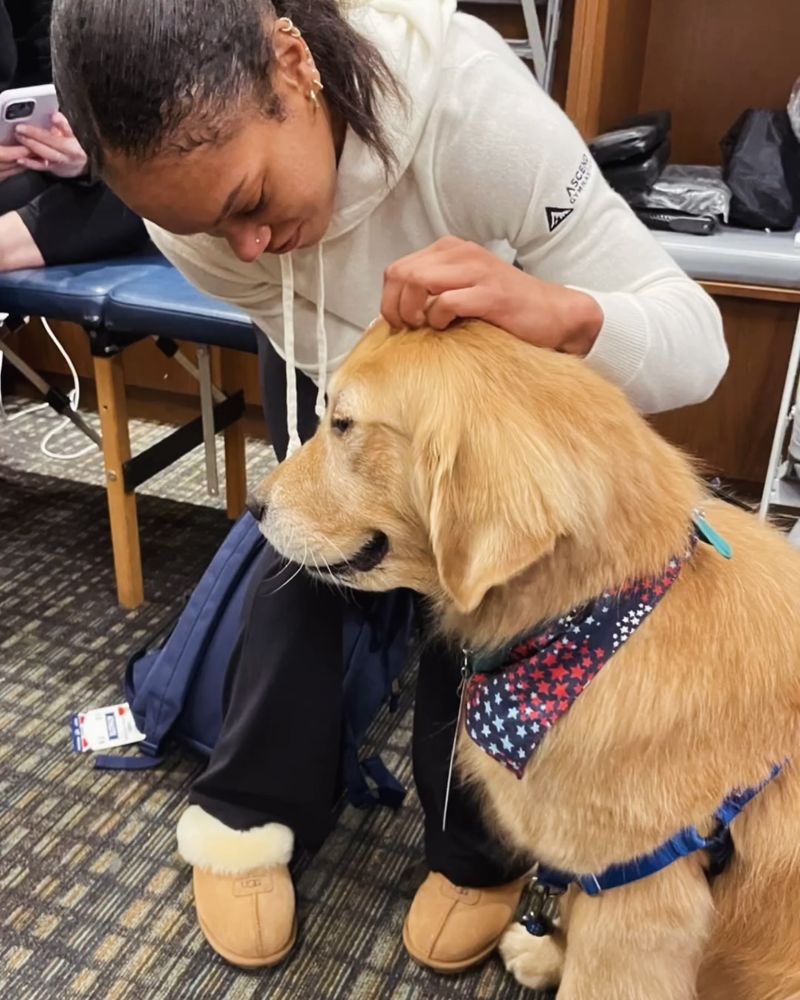26 Ways Dogs Are Helping Us Live Longer, According To The Latest Research

In recent years, scientific research has highlighted the extraordinary impact dogs have on human longevity.
These beloved pets are not just companions; they are enhancing our lives in ways we never imagined. Here are some incredible ways dogs are helping humans live longer, healthier lives according to cutting-edge research.
1. Improved Mental Health

Dogs play a significant role in improving mental health by providing unconditional love and companionship.
Studies show that petting or spending time with a dog can increase levels of serotonin and dopamine, which are neurotransmitters that promote feelings of happiness and well-being. Their presence helps reduce stress, anxiety, and depression, leading to an overall improvement in mental health.
2. Reduced Loneliness

For many, dogs are not just pets but true companions that help alleviate feelings of loneliness. Their constant companionship and affection help combat isolation, particularly for people living alone or those in long-term care.
Dogs encourage social interaction, reduce feelings of sadness, and help create connections with others, making them invaluable for emotional well-being.
3. Emotional Support

Dogs offer invaluable emotional support to their owners, providing comfort during times of stress, anxiety, and sadness. Their ability to sense emotional changes in humans helps them respond to their owners’ needs, offering a non-judgmental presence and unconditional love.
This constant companionship has been linked to improved emotional well-being and a reduction in feelings of loneliness or depression.
4. Physical Fitness Boost

Owning a dog encourages more physical activity, as they need regular exercise like walks, playtime, and outdoor activities. Dog owners are more likely to engage in daily exercise, which in turn leads to improved cardiovascular health, stronger muscles, and better endurance.
Regular physical activity with a dog can also increase energy levels, helping to maintain overall health and well-being.
5. Reduced Cardiovascular Risks

Studies have shown that owning a dog can lower the risk of cardiovascular diseases. The increased physical activity from walking and playing with a dog helps reduce blood pressure, cholesterol levels, and stress, all of which are factors that contribute to heart disease.
Dog owners tend to have healthier hearts due to these lifestyle improvements, contributing to a longer, healthier life.
6. Enhanced Immune Function

Interacting with dogs has been found to boost the immune system, particularly in children.
Studies suggest that growing up in a household with a dog can lead to fewer allergies and infections, as dogs expose their owners to more bacteria, which can help strengthen the immune system.
This exposure can lead to a more resilient immune response, reducing the chances of illness.
7. Social Connection Facilitation

Dogs are natural social facilitators, often helping their owners form connections with other people. Dog owners tend to be more social, as walking a dog or visiting dog parks encourages interaction with other dog owners.
These social connections can combat loneliness, reduce stress, and enhance mental health by providing opportunities for meaningful relationships and friendships.
8. Routine And Structure

Having a dog brings routine and structure to an owner’s life. Dogs thrive on consistency, and this encourages their owners to maintain regular schedules for feeding, walking, and playing.
This structure can improve mental clarity, reduce anxiety, and help with time management, all of which can contribute to a healthier and more organized lifestyle.
9. Increased Happiness And Well-being

Simply spending time with a dog can increase feelings of happiness and well-being. The bond between humans and dogs has been shown to release oxytocin, the “feel-good” hormone, which fosters feelings of joy, love, and connection.
Regular interaction with dogs can significantly improve mood and enhance life satisfaction, leading to overall well-being.
10. Alzheimer’s And Dementia Support

For individuals with Alzheimer’s disease or dementia, dogs offer comfort and companionship, reducing agitation and providing emotional support.
Studies have shown that pets can improve cognitive function, encourage social interaction, and reduce symptoms of anxiety or depression in people suffering from these conditions. Dogs help provide routine and stability, which is essential for those with memory loss.
11. Recovery From Illness

Dogs can play a crucial role in helping individuals recover from illness by providing motivation and emotional support during the healing process. Their presence can speed up recovery time by encouraging movement, reducing stress, and lifting spirits.
Studies have shown that petting a dog can lower cortisol levels, helping to reduce the body’s stress response and support overall recovery.
12. Seizure Detection

Certain dogs are trained to detect seizures before they happen, giving owners a chance to prepare or seek help.
These dogs can sense the changes in their owner’s body chemistry or behavior that precede a seizure. The ability of dogs to detect these events and respond by alerting their owner or others can be life-saving, making them invaluable companions for people with epilepsy.
13. Mental Health Enhancement

Dogs have a profound positive effect on mental health, helping to alleviate symptoms of anxiety, depression, and PTSD.
Their constant presence provides comfort and security, allowing owners to feel less alone in their struggles. Dogs encourage outdoor activities, socialization, and routine, all of which contribute to improved mental well-being.
14. Cancer Detection

Some dogs have been trained to detect cancer in humans by sniffing out specific odors associated with the disease.
Their extraordinary sense of smell enables them to identify changes in a person’s body chemistry that may signal cancer. This early detection capability has led to breakthroughs in cancer diagnosis, allowing for earlier intervention and better outcomes.
15. Diabetes Management

Dogs can help individuals with diabetes by detecting changes in their blood sugar levels. Specially trained service dogs can alert their owners to dangerously low or high blood sugar levels, giving them the opportunity to take corrective action.
These dogs provide an essential service, improving the quality of life and safety for those managing diabetes.
16. Pain Relief

Dogs have a unique ability to provide comfort and alleviate pain for their owners. Studies have shown that spending time with a dog can trigger the release of endorphins, which are natural pain relievers.
The calming presence of a dog can help reduce chronic pain, lower stress levels, and improve overall comfort for individuals dealing with physical ailments.
17. Improved Sleep Quality

Dogs can contribute to better sleep quality by providing a sense of security and comfort at night.
The calming effect of a dog’s presence can help reduce anxiety and promote relaxation, making it easier for owners to fall asleep and stay asleep. The rhythmic sound of a dog’s breathing can also help lull owners into a deeper, more restful sleep.
18. Increased Mindfulness

Having a dog encourages mindfulness by requiring owners to focus on the present moment.
Whether it’s during a walk or while playing, dogs live in the here and now, and their owners often benefit from this mindset shift. This can help reduce stress and anxiety, promoting a sense of calm and presence.
19. Enhanced Bonding And Family Dynamics

Dogs can strengthen the bonds between family members, encouraging cooperation and shared responsibility. Caring for a dog together can improve communication, teamwork, and empathy within a family.
The unconditional love a dog provides also fosters emotional closeness, creating a deeper connection among family members.
20. Assistance For The Disabled

Dogs play an essential role in assisting individuals with disabilities. Service dogs are trained to perform specific tasks that help people with mobility issues, visual impairments, hearing loss, and more.
These dogs provide independence, safety, and emotional support, significantly improving the quality of life for their owners.
21. Stress Relief

Spending time with a dog has been proven to reduce stress levels. Petting a dog, going for walks, or simply sitting together can trigger the release of oxytocin, a hormone that promotes feelings of relaxation and happiness.
The presence of a dog offers a calming influence, helping to lower blood pressure and reduce anxiety in high-stress situations.
22. Companionship For The Elderly

For older adults, dogs provide constant companionship that can help reduce feelings of loneliness and isolation. Their unconditional love and presence help elderly individuals maintain a sense of purpose and emotional connection.
Dogs also encourage regular exercise, social interaction, and routine, which are essential for maintaining physical and mental health in older age.
23. Motivation For Outdoor Activities

Dogs naturally encourage their owners to spend more time outdoors, whether it’s going for walks, hikes, or playing in the yard.
Their need for daily exercise motivates people to engage in physical activity, which can improve cardiovascular health, enhance mood, and increase overall fitness levels. Dogs provide the perfect incentive for staying active and healthy.
24. Allergy Reduction In Children

Growing up in a household with a dog has been shown to reduce the risk of allergies and asthma in children. Early exposure to pets strengthens the immune system, helping children develop a resistance to common allergens.
Having a dog around can make the immune system more adaptable, leading to fewer allergies and improved overall health in the long run.
25. Pet Therapy In Hospitals

Dogs are increasingly being used in pet therapy programs in hospitals, where their presence has been shown to reduce anxiety and improve the mood of patients.
Visiting patients provide comfort, distraction, and emotional support, which can speed up recovery. The healing power of dogs helps create a positive atmosphere in medical settings, benefiting both patients and staff.
26. Discovery Of Unseen Conditions

Dogs have an incredible ability to detect conditions or health issues that humans might not be aware of, such as changes in blood sugar, cancerous growths, or even undiagnosed infections.
Their heightened sense of smell allows them to identify subtle chemical changes in the body that humans cannot detect, often alerting their owners to issues before they become critical.





